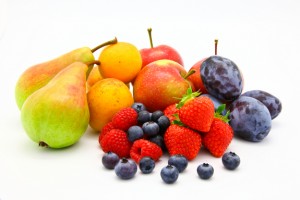Research: Flavonoids can help with weight loss
 Eating fruit and vegetables that contain high levels of flavonoids could help maintain a healthy weight according to research from the University of East Anglia (UEA) and Harvard University.
Eating fruit and vegetables that contain high levels of flavonoids could help maintain a healthy weight according to research from the University of East Anglia (UEA) and Harvard University.
The study, published in the BMJ, reveals that apples, pears, berries and peppers were found to have the greatest effect in reducing weight gain.
Researchers from the departments of nutrition at the Harvard TH Chan School of Public Health and UEA’s Norwich Medical School examined the association between the dietary intake of all flavonoids and weight change in a large study of 124,086 men and women based across the US with data collected over 24 years.
“Dietary flavonoids are natural compounds found in fruits and vegetables,” said Prof Aedin Cassidy, from UEA’s Norwich Medical School. “This is the first large study to examine the associations between consumption of all flavonoids and weight gain in middle-aged and older adults.”
“Most adults gain weight as they age and even small increases in weight can have a substantial impact on risk of high blood pressure, developing heart disease, cancer or diabetes – so strategies to help individuals maintain a healthy weight in middle age are needed.”
“We found that an increased consumption of most flavonoids were associated with weight maintenance, and even a modest weight loss. The results were found to be consistent across men and women, and different ages.”
“However, losing even small amounts of weight, or preventing weight gain, can improve health and these modest effects were seen with a small, readily achievable increase in intake of many of these fruits.”
“Just a single portion of some of these fruits per day would have an important impact on health at a population level.”
“The greatest association was found for anthocyanins – which are found in blueberries, strawberries, cherries, blackberries, grapes, radishes and blackcurrant. We also found that flavonoid polymers – found in tea and apples – were particularly beneficial, along with flavonols – found in tea and onions.”
The research team tracked participants who were part of three large prospective cohort studies: the Health Professionals Follow Up Study, Nurses Health Study, and Nurses Health Study II.
Participants self-reported changes in their weight through a questionnaire every two years, between 1986 and 2011. In addition, they self-reported their diet, lifestyle habits, and any recently diagnosed diseases every four years.
The study adjusted for a range of dietary and lifestyle factors that may have influenced the results, such as smoking status and physical activity.
The results show the amount of weight loss associated with very small intakes – called ‘standard deviations’ – including 10mg of anthocyanins and 138mg of polymers.
They found that consuming just small amounts of flavonoids correlated with maintaining a healthy weight, and even losing a little – but only around 0.1KG.
However many fruits provide high amounts of flavonoids – for example a single serving per day of blueberries contains up to 121 mg of anthocyanins and tea contains a range of flavonoids (including flavonols, flavan-3-ols and their polymers).
The research team said they hope that choosing flavonoid-rich fruits and vegetables could help people shed up to one or two pounds.
The researchers conclude that even small changes in intake have the potential to have a significant impact on helping to maintain a healthy body weight.
“People tend to put on weight as they get older. But we found that people who ate a few portions of flavonoid-rich fruits and vegetables a week maintained a healthy weight, and even lost a little,” said Cassidy. “We hope that the results will help refine previous dietary recommendations and provide guidance on which specific fruits and vegetables to choose for preventing of obesity and its potential consequences.”
“Losing or preventing even small amounts of weight can reduce the risk of diabetes, cancer, hypertension and cardiovascular disease.
“In the US, for example, most people consume less than one cup (portion) of fruits, and less than two cups of vegetables daily. This is below the recommended daily intake and should be increased to two cups of fruits, and two and a half cups of vegetables – which equates to the UK’s recommended ‘five-a-day’.” “And people may be able to improve the health benefits of eating fruit and vegetables by choosing those including high levels of flavonoids, such as apples, pears, and berries.”


































